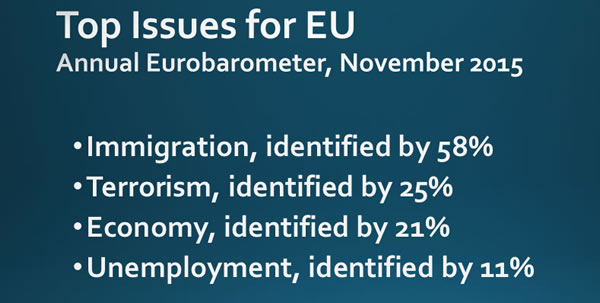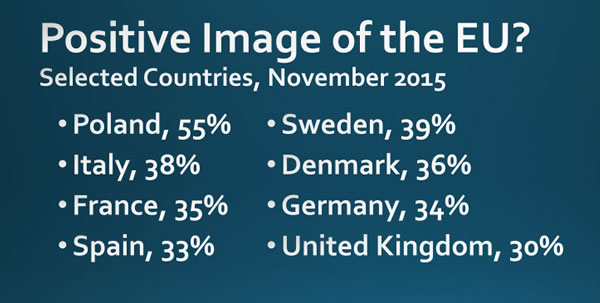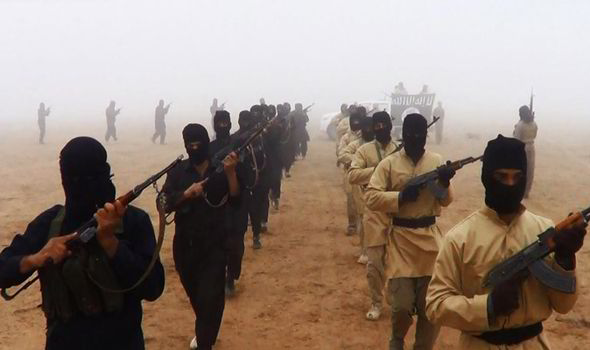Europe, cultural identity under attack, must regroup and form grand strategy to battle extremism at home and abroad.
Europe’s cultural identity is under attack. At stake are values forged over centuries, respect for freedom of thought and every single individual’s rights. This is an existential crisis.
The enemy is not Islam nor the Muslims still migrating into Europe, but a small minority of brutal people who are hijacking Islam. Their intent is not to propagate a new political system. The goal is simple, trite and not religious: destruction of the Western system including democracy, individual freedom and economic globalization. What comes after does not matter. The extremists ensnare young people as recruits, selecting those who vent anger against their societies, political systems and parents. The young people crave respectability – acknowledgement as someone to be reckoned with, to be taken seriously, and the Islamic State delivers. The hardcore, intellectual elite and determined leadership of ISIS and the young recruits share one attribute, and that is hatred of Western societies.
Little can be done about the hardcore except understanding that the battle comes down to eliminating “them or us.”
The young recruits, though, are malleable and offer a window of opportunity for European countries. The targets are Muslim communities in Europe, the large majority of whom perceive their religion as ordinary and far from extreme.
The extremists are few in number and must be separated from the Muslim communities, both outside and inside Europe.
Outside Europe, governments must intensify the search for terrorists, extremists and hardliners. Troops on the ground and massive bombings with civilian casualties are not helpful, despite the support of many Europeans. If overdone, such tactics play into the hands of the terrorists who argue that Europe, the West and Russia are at war with Islam. The argument helps in recruitment.
Instead, a selective military tactic is needed with pinpointed operations, aiming at destroying or crippling ISIS leadership. Efforts to close gaps for refugees and migrants, transfer of money, selling of oil, and communication via mobile devices should be continued and strengthened. Turkey is the pivotal country and fully onboard in the fight against terrorism. But Turkey has broadened its target to fight Kurdish citizens seeking autonomy. That sets limits for how much the West can count on Turkish collaboration in the fight against ISIS and indeed efforts to ease the waves of refugees and migrants crossing into Europe via Turkey.
[one_half padding=”0 20px 0 0″][starbox][/one_half]
Europeans and Americans must recognize that agendas in the Middle East and North Africa include conflicting goals originating from more than 2,000 years of history – religious confrontations between Sunni Muslims and Shiites, tribal conflicts, internal and old colonial disagreements, and a revival of old confrontations among the remnants of the Arab, Ottoman, Iranian and Russian empires. As outsiders, the Europeans and Americans could easily be lured into focusing on one conflict that unfolds into massive warfare.

The main battleground for the United States and Europe is at home. Muslim communities should be encouraged and praised for reinforcing the message that versions of Islam as preached by the extremists are wrong and in contradiction with the faith. European nation-states should form much stronger links with Muslim leadership and clergy practicing in Europe who can be allies in the fight against terrorism. This battle is for hearts, souls and minds of the Muslims – and as such should fought and decided inside Muslim communities.
The Europeans can and should form a grand strategy. Otherwise, the outlook for solving the crisis inside the framework of European culture and values is bleak.
Europe can leave no doubt that the continent respects religious freedom, but ultimately the migrants must adapt and adjust to European norms and values as defined in the Lisbon Treaty: Respect for human dignity, freedom, democracy, equality, the rule of law and respect for human rights, including the rights of persons belonging to minorities. These values are common to the member states in a society in which pluralism, non-discrimination, tolerance, justice, solidarity and equality between women and men prevail.
Those who choose to live in Europe must adhere to a societal system that is sufficiently malleable and flexible to accommodate variations, but not fundamental differences of values, ethics and norms.
The Muslims living in Europe want to have a decent life, live in peace and care for their families. They came to Europe hoping for better opportunities. Due to a flailing global economy, such expectations have been tough to meet, for immigrants and long-time Europeans, too. Yet there is no escape hatch. Unless the economy improves and a chance for a better life is offered, many will be discouraged and direct frustrations against the societies where they live. The European far-right, including the Front National in France and similar political parties in Britain and the Nordic Countries, exploits analogous feelings among Europeans who feel their identity is under attack, their social welfare threatened and economic future uncertain. Anti-Islamist groups throughout Europe are organizing. The mixture of xenophobia with a touch of racism through Islamophobic acts and angst is all too visible, conveying to migrants that they are not welcome, and challenges integration.
Sweden and Finland plan to send back almost 50 percent of asylum seekers. No one should dispute the right of countries to form a judgment on whether asylum seekers fulfill the criteria according to international treaties, but the reality is that political leaders are increasingly caving in to far-right parties, scaring refugees and immigrants away.

A better life does not necessarily need to be inside Europe. The majority of migrants having settled in Europe may prefer to stay, but some would prefer pursuing the dream in their own homelands. Many would prefer avoiding Europe as attitudes vis-a-vis migrants and refugees harden and spread, with some governments posting advertisements advising migrants not to come and some like Danish government threatening to confiscate belongings.
Europe could step up economic and trade programs to strengthen the development and growth in adjacent regions, including the Middle East, North Africa. EU association agreements exist with almost all countries in this geographical area and would be given more clout. The snag is that such programs cost money, which Europe lacks due to fiscal restraints. Exports would compete with European producers of Mediterranean agricultural products many of whom face fierce market conditions in depressed regions. Politically it’s a tall order for Europeans, already struggling and divided, and requires more redistribution of money from rich to poorer regions inside Europe. The political will among the richer countries may not be there.
Europe must take a hard look at the Schengen Agreement securing border-free travel among the 26 countries. This agreement, crafted in the 1980s, did not foresee the current pressure on Europe’s external borders. Without a genuine strengthening of external border controls – negligible compared to US external border controls – it’s unlikely that inter-European free border passage can be maintained. Indeed, temporary border checks may be allowed for up to two years.
The EU faces tough political questions and must determine how many refugees and migrants can be admitted while stopping the political chaos and fear. The task is immediate, and the consequences could be the long-term future of Europe and its very identity.
Rights:Copyright © 2016 YaleGlobal and the MacMillan Center

